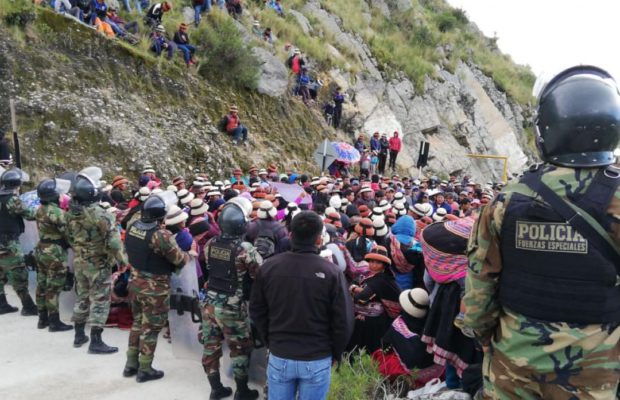On March 28, leaders of over 38 peasant communities of the Challhuahuacho district of Cotabambas province in the Apurímac department of Peru began an indefinite strike in support of the protests carried out against the Chinese mining company, MMG Limited Las Bambas.
The peasant community of in Nueva Fuerabamba city in Challhuahuacho district has been protesting since February 4, demanding that the government and the mining company pay fair compensations for the communal territory used for constructing roads to transport ore from Las Bambas to the port of Matarani in Arequipa region. The peasants have also blocked roads for more than 50 days to restrict the passage of MMG’s vehicles in the Yavi Yavi farm in the Chumbivilcas province of Cusco, a section of road between Apurímac and Arequipa.
The community members are also demanding the release of Gregorio Rojas, the president of the Peasant Community of Fuerabamba, as well as legal advisers Frank Chávez Sotelo and Jorge Chávez Sotelo, who were arrested on March 21 in Lima. They were accused of instigating the community members and extorting money from the owner of MMG company.
The regional government of Apurímac, as well as the mayors of the provinces of Abancay, Andahuaylas, Antabamba, Aymaraes, Chincheros and Grau, expressed their support to the demands of the peasant community of Fuerabamba.
Peru is the world’s second largest copper producer. Las Bambas is Peru’s largest copper mine, with an estimated lifespan of more than 20 years. Operations began in 2015, with an investment of USD 10 billion. MMG Ltd. produces around 400,000 tons of copper a year and earns three quarters of profit from the extracted copper.
The communal land, invaded by the mining company for constructing the highway, is the private property of the peasants. The construction is affecting the everyday life and health of the community. Moreover, the construction dust is also harming their crops and pastures. The peasants have not only been denied rightful compensation for their lands but are also being blamed for economic losses.
On March 22, the protesters, mostly women and children, blocked the entrance to the mine, demanding the release of Rojas and the legal advisers. The police used repressive measures and tear gas bombs to disperse the crowd. On March 24, some 2,000 police officers and 300 soldiers were sent from Arequipa to the city to restore order.
The Red Muqui, an umbrella organization comprising of several social and peasant organizations that defend and promote respect for the rights of rural and peasant communities, condemned the “method of criminalization” used by the State to delegitimize the demands.
“We show our deep concern for the arrest of the president of the Peasant Community of Fuerabamba, Gregorio Rojas, and of the lawyers Chávez Sotelo, due to the accusation that they would be part of a “criminal organization”, as the Prosecutor’s Office charges them. Regarding the lawyers, we note that there must be a prompt and impartial investigation to determine if they are responsible. There may be different legal strategies, but we believe that the defense of rights cannot be criminalized, especially when it comes to defending human rights. These methods of criminalization where the criminal law is illegitimately used, are a recurrent state practice to dismantle the community organizations seeking to enforce respect for their rights,” the Red Muqui said in a statement.
The Defence Front of the Interests and Development of the Province of Andahuaylas (FREDIPA) have called for a 24-hour strike on April 3 in the entire Apurímac department, in support of the community members of Fuerabamba.





